This article needs additional citations for verification .(July 2021) |
| |||||
| Decades: | |||||
|---|---|---|---|---|---|
| See also: | |||||
This article lists some of the events that took place in the Netherlands in 2003.
This article needs additional citations for verification .(July 2021) |
| |||||
| Decades: | |||||
|---|---|---|---|---|---|
| See also: | |||||
This article lists some of the events that took place in the Netherlands in 2003.
| | This section needs expansion. You can help by adding to it. (September 2013) |

The Netherlands is a parliamentary representative democracy. A constitutional monarchy, the country is organised as a decentralised unitary state. The Netherlands can be described as a consociational state. Dutch politics and governance are characterised by a common striving for broad consensus on important issues, within both of the political community and society as a whole.

Jan Pieter "Jan Peter" Balkenende Jr. is a Dutch politician of the Christian Democratic Appeal (CDA) party and jurist who served as Prime Minister of the Netherlands from 22 July 2002 to 14 October 2010.

Prince Friso of Orange-Nassau was the second son of Queen Beatrix of the Netherlands and Claus von Amsberg, and younger brother of King Willem-Alexander. Friso was a member of the Dutch Royal Family, but because of his marriage without an Act of Consent in 2004, he lost his membership of the Dutch Royal House and was no longer in the line of succession to the throne.

The second Balkenende cabinet was the executive branch of the Government of the Netherlands from 27 May 2003 until 7 July 2006. The cabinet was formed by the Christian-democratic Christian Democratic Appeal (CDA), the conservative-liberal People's Party for Freedom and Democracy (VVD), and the social-liberal Democrats 66 (D66) after the election of 2003. The cabinet was a centre-right coalition and had a slim majority in the House of Representatives with Christian Democratic Leader Jan Peter Balkenende serving as Prime Minister. Liberal Leader Gerrit Zalm, a former Minister of Finance, served as Deputy Prime Minister and returned as Minister of Finance, while former Progressive-Liberal Leader Thom de Graaf served as Deputy Prime Minister and Minister without Portfolio for the Interior.

André Rouvoet is a retired Dutch politician of the Reformatory Political Federation (RPF) party and later the Christian Union (CU) party and jurist. He is the chairman of the executive board of the Healthcare Insurance association (ZN) since 1 February 2012.
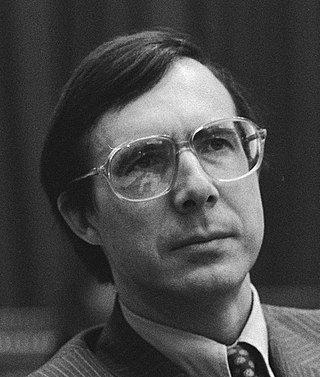
Laurens Jan Brinkhorst is a retired Dutch politician and diplomat of the Democrats 66 (D66) party and jurist.
This article lists some of the events that took place in the Netherlands in 2002.
In the Kingdom of the Netherlands, the monarchy of the Netherlands is a constitutional office and is controlled by the Constitution of the Netherlands. A distinction is made between members of the royal family and members of the royal house.
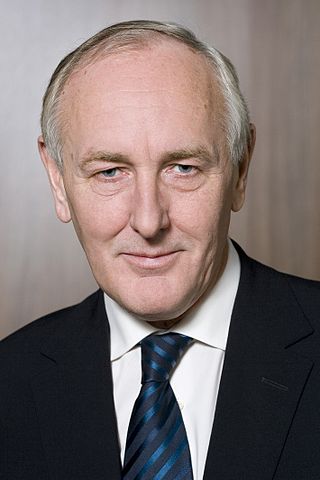
Johannes Wijnandus "Johan" Remkes is a Dutch politician and nonprofit director who served as Deputy Prime Minister of the Netherlands from 2002 to 2003 under Prime Minister Jan Peter Balkenende. He is a member of the People's Party for Freedom and Democracy (VVD).

General elections were held in the Netherlands on 22 November 2006, following the fall of the Second Balkenende cabinet. The election proved relatively successful for the governing Christian Democratic Appeal (CDA) which remained the largest party with 41 seats, a loss of only three seats. The largest increase in seats was for the Socialist Party (SP), which went from nine to 25 seats. The main opposition party, the social democratic Labour Party (PvdA) lost nine of its 42 seats, while the right-liberal People's Party for Freedom and Democracy (VVD) and the progressive liberal Democrats 66 lost a considerable portion of their seats, six of 28 and three of six, respectively. New parties, such as the right-wing Party for Freedom (PVV) of former VVD MP Geert Wilders and the animal rights party Party for the Animals (PvdD) were also successful, with the PVV winning nine seats and the PvdD winning two, thereby becoming the first animal rights group to enter a European parliament.
Klaas Bruinsma was a major Dutch drug lord. He was shot dead on 27 June 1991 by organized crime member and former police officer Martin Hoogland. He was known as "De Lange" and also as "De Dominee" because of his black clothing and his habit of lecturing others.
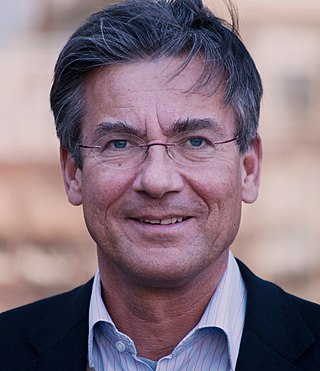
Maxime Jacques Marcel Verhagen is a retired Dutch politician and historian. A member of the Christian Democratic Appeal (CDA), he served as Deputy Prime Minister of the Netherlands from 2010 to 2012 under Prime Minister Mark Rutte.
This article lists some of the events that took place in the Netherlands in 2006.

The fourth Balkenende cabinet was the executive branch of the Government of the Netherlands from 22 February 2007 until 14 October 2010. The cabinet was formed by the Christian-democratic Christian Democratic Appeal (CDA) and Christian Union (CU) and the social-democratic Labour Party (PvdA) after the election of 2006. The cabinet was a centrist grand coalition and had a slim majority in the House of Representatives with Christian Democratic Leader Jan Peter Balkenende serving as prime minister. Labour Leader Wouter Bos served as Deputy Prime Minister and Minister of Finance while Social Christian Leader André Rouvoet served as Deputy Prime Minister and Minister without Portfolio for Health, Welfare and Sport.
Smit is a Dutch occupational surname. It represents an archaic spelling of the Dutch word "smid" for "smith" and is the Dutch equivalent of the English and Scottish surname Smith.
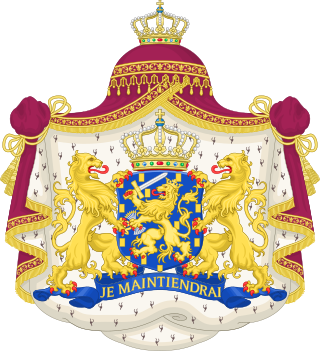
The monarchy of the Netherlands is governed by the country's constitution, roughly a third of which explains the mechanics of succession, accession, and abdication; the roles and duties of the monarch; the formalities of communication between the States General of the Netherlands; and the monarch's role in creating laws.
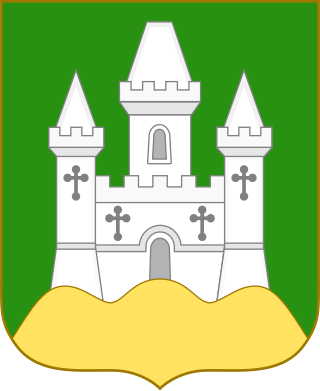
The House of Amsberg is a German noble family of Polabian origin that originated in Mecklenburg and whose agnatic head is the present King of the Netherlands, Willem-Alexander. A great-grandson of a blacksmith and grandson of a baker, parish pastor August Amsberg (1747–1820) started calling himself "von Amsberg" in 1795, and the family's right to use this name was confirmed in 1891 by Frederick Francis III, Grand Duke of Mecklenburg-Schwerin. By this permission to use a nobiliary particle, the family effectively became part of the German untitled nobility of the Grand Duchy of Mecklenburg-Schwerin.
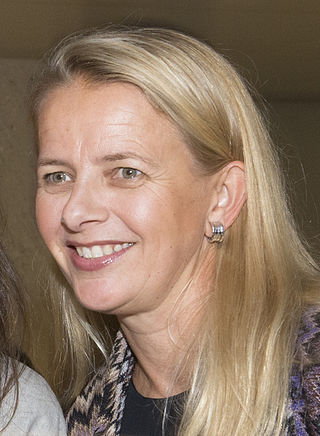
Princess Mabel of Orange-Nassau, more commonly known as Mabel van Oranje, is the widow of Prince Friso and sister-in-law of King Willem-Alexander of the Netherlands. She spends her time in human rights activities such as co-founding War Child Netherlands, the European Council on Foreign Relations, and Girls Not Brides: The Global Partnership to End Child Marriage.
Wisse is a Dutch given name and patronymic surname. The given name may come via "Wiso" from the Germanic root -wisu-, meaning "good". The surname "van Wisse" is a Dutch toponymic surname and has a separate origin.
This article lists some of the events that took place in the Netherlands in 2004.